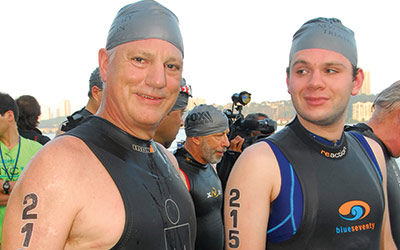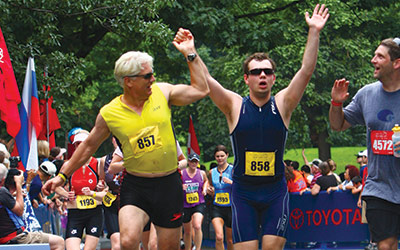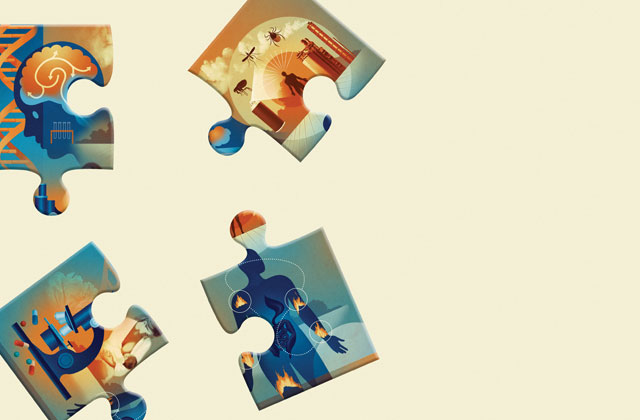In 2009 my son, Zachary, then 19, completed his first Olympic-distance triathlon. He was younger than nearly all of our competitors in the New York City Triathlon, and he earned several distinctions while finishing in the fine time of 3 hours, 19 minutes, and 50 seconds.
Zachary was probably the only cyclist who aimed for and hit every puddle as we made our way along the 25-mile bike course on the Westside Highway. He entertained his cousin, Jeff, who was by his side during the 6.1-mile run through Central Park, by singing Disney songs and performing entire soundtracks from Dr. Seuss and Spice Girls videos. Of all the participants, I’m certain he had the most fun.
And he is one of the only triathletes I know of who also happens to be autistic.
There’s a saying among parents in the autism community: If you know one autistic kid, then you know one autistic kid. All of our children are unique, and Zachary — known as Zacko to family and friends — is not only a joy to live with but also an extraordinary athlete. Now 24, he’s physically strong but has weak linguistic skills. He runs 10 to 20 miles a week and does strength and agility workouts with a trainer. Together, we bike between 25 to 60 miles weekly and swim at our local gym.
August 2014’s NYC Triathlon will mark the fourth race for us. Following that, Zachary has set his sights on the New York City Marathon.
Perhaps it’s a father’s pride, but I’m continually impressed by his enthusiasm and zest for life. I get a lot of wisdom from my son.
When Zachary was diagnosed as autistic (just before his third birthday), the best medical minds in New York said there was nothing we could do. We were told that autistic kids essentially could not be educated: We should find an institution to house him. The experts looked me in the eye and said that if we tried to keep him home with my daughter, Skylar, who is 17 months older than Zachary, he would prove too disruptive and perhaps even threaten the family’s stability. Like many parents of autistic kids, we rejected that notion.
My wife, Nancy, began looking for educational programs. The search through Manhattan’s special-needs preschools seemed fruitless until Nancy learned of Alpine Learning Group, a program in northern New Jersey led by renowned researcher Bridget Taylor, PhD, that was successfully teaching autistic kids by way of applied behavior analysis (ABA). This scientific approach to classic behaviorism was championed in the ’60s by Ole Ivar Lovaas, whose 1965 paper on ABA’s benefits in building communication between autistic children and their families proved groundbreaking.
Much of ABA is one-on-one: A teacher sits in a chair and strives to get the student simply to look at her. When the child responds, he’s rewarded. (Zachary got a jellybean.) Then the teacher might ask him to touch his nose, and he’s rewarded when he does. It requires a tremendous amount of focus from both the teacher and student, especially for a boy like Zacko, who is particularly active.
There hasn’t been much emphasis on physical education in the autistic community. Although there is a well-equipped gym and playground at Alpine, and all students engage in some level of daily activity, academics and learning appropriate social interaction take center stage. Many students receive tutoring after school as well, which leaves little time for them to participate in athletics.
I believe exercise has been essential to Zachary’s development and has greatly improved his quality of life. Some of his classmates also benefit from their time in the school gym. I can’t help but wonder if it would also help other children with autism.
Much of the work Zachary was doing in ABA involved imitation, and he can imitate beautifully and quickly. Even without the benefit of much language, he’ll look at me, understand, and exhibit the behavior. I’ve been a runner, swimmer, and bicyclist most of my adult life, and even at 4 years old, Zacko was itching to go.
The day he started riding with training wheels was the day we took the training wheels off. From the beginning, he looked like he stepped out of the Tour de France. It came instinctively to him. We’d bike several miles at a time together, adding new routes as he grew up.
Swimming was more difficult. As much as Zacko loved to float in the waves near our North Carolina beach house, he did not swim a conventional stroke of any kind. Then one day at our community pool, he watched his friend Rafi swimming from end to end and immediately picked it up. Just like flipping a light switch, he swam.
Initially we didn’t think of ourselves as “training”; it was just me saying, “Come on, let’s go.” Yet seeing his enthusiasm and knowing his love of pageantry, I figured he’d be a natural triathlete.
Zachary could never train for a triathlon alone, though. He doesn’t understand traffic, and there’s a real danger that he will ride into a crossing vehicle at intersections. He can be easily distracted on the course, as we saw in the 2009 NYC Tri: Nearing the finish line, as every other runner circled the Angel of the Waters fountain and looked ahead to the finish line with determination or relief, Zachary became mesmerized by the fountain itself; on his own, he would have hopped in to enjoy the cool water. He sees no reason to run fast just because there’s a race under way. And he doesn’t care at all what other people think.
On the NYC Tri’s closed courses, Zachary is safe biking alone. I feel comfortable setting him free there — and love seeing him perform independently, without any special help.
Originally, our workouts together were just my way of seeking some shared experiences. We couldn’t sit down and have a conversation like I did with my daughter, and I didn’t have that special maternal bond Zacko had with his mom. Other fathers of autistic kids have shared with me their struggle to have much of a relationship with their children. Our triathlon training has created a new, instinctive language for us — one that I never thought we’d have.
Like the experience of training with any other fitness buddy, our shared physical feats have deepened our bond. When I doubt I can get over a hill, I look to Zachary, happy and driven, young and strong, unconcerned about finishing but knowing he will.
I’ve seen how Zachary’s enthusiasm and willingness work for him, even when he’s gotten some cuts and wounds along the way, as we all do. The scrapes heal, and he returns to the challenge without hesitation. He isn’t afraid of the open-water swim. And being the fastest finisher is never his concern. He simply enjoys the race.
And through it all, Zachary has helped me find the fun in sports and fitness again. I see his joy, his focus, his absence of fear, and I try my best to follow his example.
Success Summary

Meet: Zachary Hamrick, 24, a triathlete with autism who trains with his father, Steve, 62, and lives with his family in New Jersey. He has one older sister, Skylar.
Big Achievements: Finishing three Olympic-distance NYC Triathlons with his dad and cousin at a personal best of 2 hours, 48 minutes. He’s now preparing to complete his fourth NYC Tri independently.
Big Inspiration: Sharing a love of activity with his dad, a lifelong biker, swimmer, and former runner.
What Worked: Exercise, and later, tri training, proved an ideal — and essential — balance with hours of schoolwork and his natural need to run and play.
Words of Wisdom: Says Steve Hamrick: “We were told that nothing could be done to help Zachary when he was diagnosed with autism, but we weren’t willing to accept that. His specialized education, along with regular workouts and triathlon training, has given Zacko a real life.”
Learn more about Zachary and Steve Hamrick’s training in the PBS documentary Autism Now.



This Post Has 0 Comments